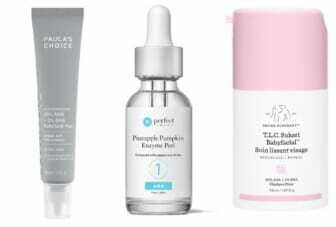
We all show signs of aging as our youthful supply of the natural collagen we’re born with has dwindled quite a bit—leading to some fine lines and wrinkles as well as skin laxity—and the going only gets rougher moving forward. Enter collagen supplements. But is collagen good for you?
Curious about the booming supplemental collagen business, we reached out to a board-certified dermatologist for some answers. Like… Is collagen good for you? Does it actually work? And if so, how much should you be taking?
What is Collagen?
Before diving into supplemental collagen, let’s first cover what collagen is and why it’s so dang important in terms of looking like a youthful, dewy dumpling.
“Collagen is a protein found in the highest abundance in the human body. It is one of the major building blocks of skin, muscle, tendons, ligaments, and bones and is also found in blood vessels, eyes and teeth,” explains Dr. Corey L. Hartman, a board-certified dermatologist and the Founder of Skin Wellness Dermatology in Birmingham, Ala.
It’s quite literally the natural glue that helps hold everything in our body together. It’s what makes baby cheeks, arms, and legs so delightfully squishy and plump!
A Dwindling Collagen Supply
“As we mature, our bodies produce less and less collagen,” says Dr. Hartman. “You really start to see a decrease in collagen production in your 30s, which is in line with when many of my patients come to me with concerns about increased fine lines, wrinkles, and drier skin.”
He adds that not only is your body losing existing collagen, but it is losing its ability to reproduce collagen as quickly as it once did. And the collagen that your body does create? Well, it’s not quite as good as the stuff coming off the assembly line in your 20s.
So what’s a 30-something to do? Is collagen good for you in supplemental form?
What is Supplemental Collagen?
In hopes of slowing or counteracting the effects of a dwindling collagen supply, some people have turned to supplemental collagen. These usually come in powder form and are made with either plant-based collagen or animal-derived collagen. The idea is that you add them to your smoothies, water, shakes or certain foods in attempts to get more collagen into your body.
Why Is Collagen Good For You?
While there’s still some mixed opinion on whether collagen is good for you, there’s some preliminary science out there that points in a positive direction.
“There is some research to show that taking oral collagen supplements can help with wound healing and skin aging, as well as increasing skin elasticity, hydration and
dermal collagen density,” says Dr. Hartman. “A meta-analysis done in 2021 published in the International Journal of Dermatology also showed similar results.”
He adds that collagen supplements can also potentially improve the beauty of our skin by increasing our body’s natural collagen production. This, in turn, can impact skin texture, fine lines, wrinkles, firmness, and elasticity.
What to Look for When Taking Collagen Supplements
All collagen supplements are not created equally, and collagen supplements are not regulated by the FDA. In other words, there’s no singular set of rules companies must follow when creating their collagen supplement products. So, is collagen good for you as a supplement?
“There are a few things to look for when evaluating supplements. The first is look of the supplement itself, especially if you are taking a powdered supplement,” says Dr. Hartman. “High-quality collagen is totally clear when mixed with water. You want to avoid supplements that are yellow, brown, cloudy, or tan when you mix them with water.”
He adds that, when looking for a collagen powder specifically, to seek out marine or bovine supplements that contain type 1 and type 3 collagen. These two types of collagen are needed for skin health.
“Also, watch out on the gummies. Oftentimes they contain added sugar, so if you are diabetic or are watching your sugar intake, powdered collagen or capsule collagen might be better for you.”
How Much Collagen Should I Take?
Since every product is different, it’s best to follow the on-label usage instructions. Do not take more than the recommended amount.
When Is the Best Time to Take Collagen?
There’s really no best time of day to take collagen. Some people like taking collagen with their morning meal in a smoothie or shake, while others have a collagen-infused snack in the early afternoon. When in doubt, follow the on-label instructions.
What Results Can You Expect Taking Collagen?
For those consistently taking collagen, before and after images might demonstrate some small, notable improvements. However, it’s unlikely you’ll experience a drastic difference from collagen supplements alone. A consistent daily skincare regimen that consists of cleansing, moisturizing, and SPF—and a healthy diet paired with exercise—are arguably more important in maintaining health and slowing signs of premature aging.
The Bottom Line: When asking yourself, “Should I take collagen supplements?” the the reality is that there’s no real harm in doing so. Collagen is safe to take, and early research has shown some promising results. If you do opt to take collagen, prioritize high-quality collagen supplements that are low in sugar and always follow usage instructions.



